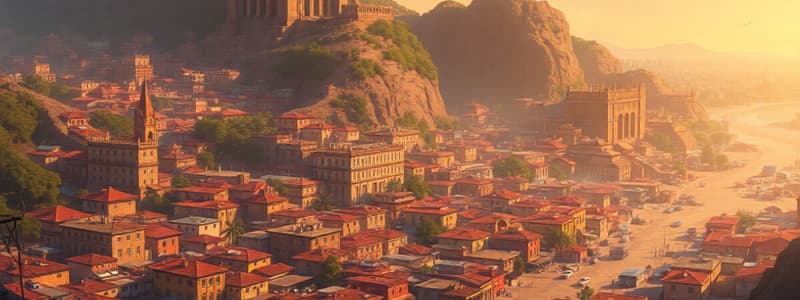Podcast
Questions and Answers
What is a primary characteristic of urban sprawl as depicted in the context of Greater Cairo?
What is a primary characteristic of urban sprawl as depicted in the context of Greater Cairo?
- The expansion of the city's boundaries with dispersed development. (correct)
- A compact, walkable urban core with limited expansion.
- Dense, high-rise buildings concentrated in the city center.
- An urban form defined by well-defined borders and green belts.
How does the unplanned development in the city (slums) affect emergency services?
How does the unplanned development in the city (slums) affect emergency services?
- It enhances the efficiency of emergency services due to compact layouts.
- It improves emergency response times due to local familiarity with the area.
- It has no impact on emergency services, as these areas are self-sufficient.
- It complicates the delivery of emergency services due to poor planning. (correct)
What is a key attribute that defines a planned city or new town?
What is a key attribute that defines a planned city or new town?
- Self-dependence through comprehensive amenities and services. (correct)
- A lack of diverse employment opportunities to reduce commuting.
- Dependence on existing urban centers for essential services.
- A focus on residential zones with minimal commercial development.
How do 'New Towns in Town' aim to address the issues of large, dominant cities?
How do 'New Towns in Town' aim to address the issues of large, dominant cities?
Which factor most significantly distinguishes a satellite town from other urban forms?
Which factor most significantly distinguishes a satellite town from other urban forms?
What critical deficiency in rural areas led to the establishment of Regional Growth Centers (RGCs)?
What critical deficiency in rural areas led to the establishment of Regional Growth Centers (RGCs)?
What was a major objective outlined in the October Working Paper regarding urban development in Egypt?
What was a major objective outlined in the October Working Paper regarding urban development in Egypt?
How did the Egyptian government strategically view new towns in relation to Cairo, as outlined in the October Working Paper?
How did the Egyptian government strategically view new towns in relation to Cairo, as outlined in the October Working Paper?
Which of the following characterizes first-generation new towns in Egypt?
Which of the following characterizes first-generation new towns in Egypt?
What distinguishes second-generation new towns like Al-Sheikh Zayed and Al-Obour in the context of Egyptian urban development?
What distinguishes second-generation new towns like Al-Sheikh Zayed and Al-Obour in the context of Egyptian urban development?
Which of the following is an example of a third-generation new town in Egypt?
Which of the following is an example of a third-generation new town in Egypt?
What is a defining characteristic of the fourth generation of new towns in Egypt?
What is a defining characteristic of the fourth generation of new towns in Egypt?
What does the term 'phantom limbs' refer to in the context of Cairo's urban development?
What does the term 'phantom limbs' refer to in the context of Cairo's urban development?
Which factor contributes to the disadvantages of unplanned cities/slums?
Which factor contributes to the disadvantages of unplanned cities/slums?
Which one of the following is not a key feature for a planned city or new town?
Which one of the following is not a key feature for a planned city or new town?
In Regional Growth Centre’s what attracts different socio-economic groups to the region?
In Regional Growth Centre’s what attracts different socio-economic groups to the region?
According to Golany (1976), what services do new towns in RGCs offer?
According to Golany (1976), what services do new towns in RGCs offer?
What does Laursen (2012) say about satellite towns?
What does Laursen (2012) say about satellite towns?
What factor determines that a site should be selected based upon for a 'New Town In Town'?
What factor determines that a site should be selected based upon for a 'New Town In Town'?
What term did the United States introduce to describe a sizable town?
What term did the United States introduce to describe a sizable town?
What does the new city contribute to doing?
What does the new city contribute to doing?
A town needs to be built on a site without what, in order to be considered a planned city?
A town needs to be built on a site without what, in order to be considered a planned city?
Which of the following is an advantage of an unplanned city?
Which of the following is an advantage of an unplanned city?
The October working paper stated the importance of what?
The October working paper stated the importance of what?
While the government remained in Cairo, what was believed to be capable of attracting residents as strongly as the capital?
While the government remained in Cairo, what was believed to be capable of attracting residents as strongly as the capital?
Flashcards
Urban Sprawl
Urban Sprawl
The uncontrolled expansion of urban areas.
Informal City
Informal City
Cities that have grown organically and without formal planning, often characterized by a lack of infrastructure and services.
The unplanned city (slums)
The unplanned city (slums)
The unplanned city which is built by people and related to their needs and financial capabilities.
Planned Cities (New Towns)
Planned Cities (New Towns)
Built on a site without any urban concentrations, large enough for self-dependence while providing individuals and families with commercial needs, education, social activities, culture institutions, industry, and a wide labour market.
Signup and view all the flashcards
New City
New City
An unconventional sizeable town that is newly developed or part of an existing urban centre coordinated by both public, private and local government agencies
Signup and view all the flashcards
Satellite Town
Satellite Town
By definition, a satellite town is not economically independent. It is located close to the city centre to allow rapid commuting.
Signup and view all the flashcards
Regional Growth Centre (RGC)
Regional Growth Centre (RGC)
The primary objective of this urban area is to address urban and rural challenges following World War II.
Signup and view all the flashcards
The October Working Paper
The October Working Paper
New towns with an independent economic base were believed to be capable of attracting residents as strongly as the capital.
Signup and view all the flashcards
First Generation new towns
First Generation new towns
New towns include several industrial city schemes that are labelled self-sufficient communities.
Signup and view all the flashcards
Second-generation cities
Second-generation cities
Wealthy suburbs
Signup and view all the flashcardsStudy Notes
Urban Sprawl
- Greater Cairo is surrounded by:
- Qalyub
- Shubra al-Khema
- Matariya
- Ain Shams
- Masr el Gedida
- Kardasa
- Zamalek
- Mohandeseen
- Dokki Tahrir
- Medinet Nasr
- Rhoda
- Giza Sq
- Pyramid st.
- Giza Pyramids
- Old Cairo
- Maadi
Rise of the Informal City
- The unplanned city is often referred to as a slum.
Advantages of Unplanned cities
- These cities are built by the people and cater to their needs and financial capabilities
- They are considered vernacular architecture
- Compact planning allows walkability, and shaded streets.
- They are usually located close to the city centre
Disadvantages of Unplanned cities
- They have poor infrastructure
- Emergency services are not factored into planning
- Unregistered buildings mean less stability
- There are no building regulations
- The lack of building regulations means unsafe structures
Planned Cities or New Towns
- They are built on a site without any urban concentrations
- Large enough for self-dependence
- Provides individuals and families with commercial needs, education, social activities, culture institutions, industry, and a wide labour market".
- Self-contained
- A balanced Community
- Diverse land use
- Self governance
- Size
New City
- The United States introduced the term to describe an unconventionally sizeable town
- It may be newly developed or part of an existing urban centre
- This is coordinated by public, private and local government agencies
- It contributes to addressing housing demands, employment requirements for various levels of skill and income, diverse social classes, race and age groups
- Developing countries create new capital cities to adjust the public image and provide a government administrative centre
New Town In Town
- It is an urban extension to an existing large city
- It follows the main principles of the new town philosophy
- The site is selected based upon distinct urban features, including specialised shopping districts
- These shopping districts include artisans working on-site and unique architectural identity
- New town in-town presents a possible solution when there is an urgent need for an effective strategy to handle problems of large dominant cities through gradual rehabilitation.
Satellite Town
- These towns are not economically independent.
- They are located close to the city centre to allow rapid commuting.
- They can serve as dormitories for city dwellers.
- These are mainly young middle class married couples working in nearby urban centres.
- The town has its local government and separate identity from the central city.
- The population range is between 30,000 and 250,000 inhabitants.
- The town is usually surrounded by a green belt and connected to the greater metropolitan region with an efficient mass transit system.
Regional Growth Centre (RGC)
- Thie urban typology was designed to rectify urban and rural problems after World War II
- Rural areas lost vitality through low income, absence of a young workforce, failure to provide education, inadequate transport, and the scarcity of social facilities.
- This was addressed by setting up RGCs to service the region.
- New towns service only their residents while the RGCs service the entire region.
- Low technical intensity industries included in the RGCs provide different age groups with employment and diverse land use
- These industries also attract different socio-economic groups to the region
The October Working Paper
- "The New Map for Egypt" laid down the basis for Egypt’s urban development policy.
- Decentralisation of the economy and population and creating diverse economic and social environments in the desert beyond the Nile Valley are important.
- Priorities for urban development include the reconstruction of the Canal cities after the war devastation and decentralizing power from Cairo to strong local governments.
- New towns with an independent economic base were believed to be capable of attracting residents as strongly as the capital, while the government remained in Cairo.
New Town Generations
- First Generation new towns include several industrial city schemes that are labelled self-sufficient communities
- Tenth of Ramadan
- Sixth of October
- El-Sadat
- Fifteenth of May
- Second-generation cities emerged in the mid-1980s
- Al-Obour
- Al-Shorouq
- Al-Sheikh Zayed
- Badr
- The above are considered wealthy suburbs
- Third-generation new towns
- New Cairo
- New Thebes
- New Aswan
- New Minia
- Fourth generation new towns
- New Administrative Capital
- New 6 October
- New Zayed
- New Obour
- New Alamein
- New Mansoura
- There are 20 in total.
Studying That Suits You
Use AI to generate personalized quizzes and flashcards to suit your learning preferences.





